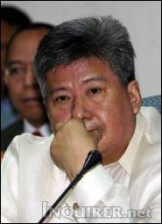Legacy victims vow to press raps even after owner dies
Undaunted by the death of Celso de los Angeles, the owner of the Legacy Group of Companies that is behind one of the biggest financial scams in the country, his victims on Wednesday vowed to press ahead with the case of syndicated estafa by indicting his widow and son, and running after his own estate.
“We intend to indict his wife and son. The wife and son should be included in the syndicated estafa case,” Philip Piccio, president of the Parents Enabling Parents Coalition (PEP Coalition), said by phone. “We will run after the estate; whatever is left by Celso.”
De los Angeles’ death on Tuesday will not affect efforts of regulators to seek justice for victims of the group, the Bangko Sentral ng Pilipinas (BSP) said Wednesday.
BSP Deputy Governor Juan de Zuñiga Jr. said the criminal cases the central bank filed against De los Angeles would have to be dismissed following his death, but those against his cohorts would continue.
Zuñiga, the BSP’s general counsel, said civil cases involving claims against the Legacy group would also continue.
Article continues after this advertisement“We [BSP] don’t want to issue a statement on this, but to answer your question on legal implications, the cases against the others accused as well as those against the estate [Legacy group] will have to continue,” De Zuñiga told the Philippine Daily Inquirer.
Article continues after this advertisementThe BSP said it did not want to issue an official statement on the death of De los Angeles to respect his grieving family.
De los Angeles, who had throat cancer, was reported to have died on Tuesday morning at St. Luke’s Hospital in Quezon City.
The Legacy group owned 13 rural banks that were ordered closed by the BSP in late 2008 for engaging in fraudulent activities. The banks were accused of encouraging people to deposit money by offering interest rates way above market average, and of stealing the money.
Regulators said the banks made it appear that deposits were used to extend loans, which they said were eventually found to be fictitious.
Following news of his death, Piccio said the immediate plan was to include widow Ma. Concepcion Panlilio-De los Angeles and son Martin Nicolo, to whom De los Angeles had transferred his properties, in the syndicated estafa case. Piccio has yet to consult his lawyers.
“They’re living luxuriously,” Piccio said. “People are not barred from including them in the case. The case is not dead yet.”
He said this could be backed with evidence from the Senate blue ribbon committee which inquired into the case.
De los Angeles’ widow and son were originally included in the estafa case, but were dropped by then Justice Secretary Raul Gonzalez, Piccio said.
He said the plan holders had been emboldened by De los Angeles’ death.
“Who else will fight for justice?” he asked. “We’re appealing to the government to help the plan holders. The Department of Justice has to be more proactive.”
Extinguished
Justice Secretary Leila de Lima said the pending criminal cases against De los Angeles in the Department of Justice would be dismissed with his death.
The death of an accused extinguishes his or her criminal liability under the Revised Penal Code, according to the justice secretary.
“(De los Angeles’) death, however, does not extinguish whatever civil liability he may have owed his alleged victims,” she said in a text message.
But the cases against De los Angeles’ coaccused would still proceed since only the criminal liability of the deceased “is extinguished, not the crime itself,” De Lima said.
“Therefore, the prosecution of the coaccused may still proceed in order to determine their respective participation in the scheme and their resulting liability,” she said.
De Lima added: “This is especially true since the crime charged is syndicated estafa, which means all those charged as members of the syndicate are charged as principals.”
PDIC cases
Philippine Deposit Insurance Corp. (PDIC), which shouldered the payment of deposit claims by the banks’ clients, also filed several cases against the Legacy group and its officials, including De los Angeles.
PDIC president Valentin Araneta earlier told the Inquirer that the deposit insurer spent P11.5 billion to pay for the claims of depositors of Legacy-owned banks, but only generated close to half a billion pesos from the sale of assets of the banks, which were placed under PDIC’s receivership following their closure.
Araneta said PDIC was strengthening its legal team, aiming to get favorable court rulings on the cases it filed against the Legacy group and the people behind it.
He said the cases against Legacy and similar cases involving bank fraud were strongly being pursued by PDIC to help ensure that scams, which have proven to be costly for the government, were avoided in the future. With a report from Marlon Ramos
